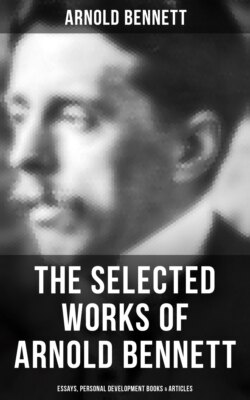Читать книгу The Selected Works of Arnold Bennett: Essays, Personal Development Books & Articles - Arnold Bennett - Страница 50
На сайте Литреса книга снята с продажи.
The Journalistic Attitude.
ОглавлениеThe beginner who aspires to be an outside contributor, or—in the slang of the profession —a freelance, must first of all comprehend the journalistic attitude. The freelance, the sender-in of unsolicited contributions, offers his wares in a market to which he has not been invited, a market which in theory does not want him. He must therefore, if he hopes to do any business, devote all his efforts to finding out what the real needs of the market are. Now journalism, as practised to-day, is quite a modem invention. In the history of no art, perhaps, has there been a change so sudden and so fundamental as that which separates the journalism of twenty-five years ago from the journalism of the present time. Modern daily journalism was invented by Mr. W. T. Stead, on the Pall Mall Gazette, and further developed by Mr. T. P. O’Connor on the Star. After a short interval it was carried a step further by Mr. Alfred Harmsworth on the Daily Mail These three men have been or are the great revolutionary forces in daily journalism. Their influence has affected all that branch of journalism, whether daily, weekly, or monthly, which deals with current events and leads or expresses public opinion. The other branch, that which has no “views” on anything, and merely seeks to entertain, owes its form to Sir George Newnes, who hit on the idea of Tit-Bits. Every characteristic of modern journalism can be traced back to one of the four papers I have mentioned. The Daily Mail was an ingenious and entirely logical combination of the other three, and its success has been the justification of the logic which evolved it.
The difference between the old and the new journalism is twofold, and lies partly in the journal’s attitude to its readers, and partly in its attitude to the world. The old journalism said to itself, in effect, when it wrote its copy: “This is what our readers ought to like. This is good for them. This is genuinely important. This ought to interest This cannot be omitted. This is our expert opinion on a vital affair—” And so on. The new journalism says to itself: “Will our readers like this, will they be interested in it? Let us not forget that our readers are ignorant, ill-informed, impatient under intellectual strain, and not anxiously concerned about many really vital matters. Let us remember that they live chiefly for themselves and for the moment; that in fact they are human. Let us look the situation in the face and decide whether our readers—not as they ought to be, but as they actually are—will read and be interested in this thing. If they won’t, however excellent it may be, it is of no use to us.” Again, the old journalism considered that many aspects of life were beneath its notice. The old journalism ignored nearly everything except politics, law, trade, and the arts. The new journalism ignores nothing, considers nothing beneath its notice. Everything that is human is good enough for the new jour nalism, and the more human it is, the more warmly does the new journalism welcome it.
The general effect of the new journalism is mixed. By sheer skill it has invested with interest a number of topics that once were hopelessly dull, and has thus brilliantly compelled the average man to acquire useful information and to form views on subjects which formerly he ignored. In short, it has educated the average man. On the other hand, its growing tendency to pander unduly to the prejudices and the intellectual laziness of the average man is thoroughly bad.
The business of the journalistic aspirant, however, is not to criticise tendencies but to follow them. And the freelance must do a little more than follow them; he must overtake them and pass them. The watchwords of modern journalism are Freshness, Brightness, and Human Interest. The efforts of the freelance, therefore, since they have to attract notice in a crowd, must be very fresh, very bright, very full of human interest.
The whole philosophy of the freelance can be summarised under three heads or maxims:—
(1) Not the sort of thing that I want to write, but the sort of thing that the public wants to read!
(2) Every department of life, no matter how apparently commonplace, has its interesting side. As a freelance it is my business to see that side and to utilise it.
(3) Every good new thing is saleable, but the proper market must be found for it
